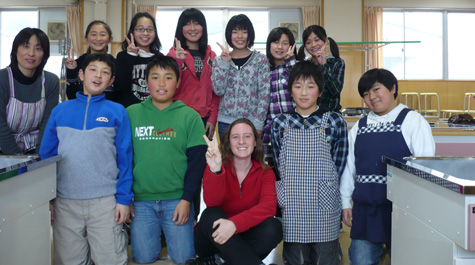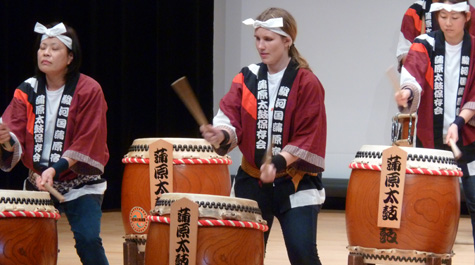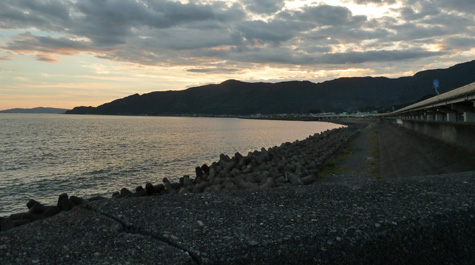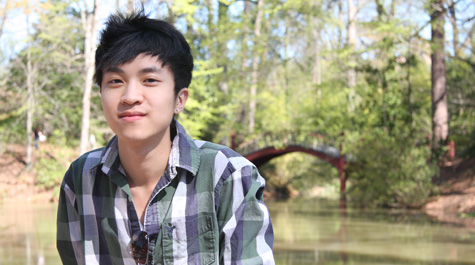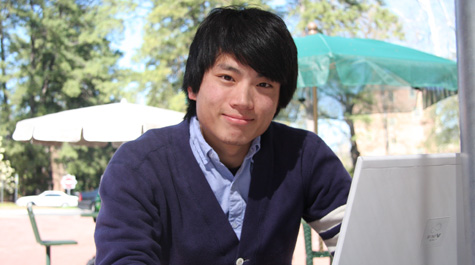日本的灾难影响了W&M家族
Alia Greenbaum ’07 had just finished teaching her sixth-grade class in the Miyagi Prefecture of Japan how to make French toast when the earth began to shake.
For Greenbaum, the earthquake felt like any other at first, but this time, the shaking didn’t stop.
“It was by no means my first earthquake, even a big one,” said Greenbaum, who has been working for the past four years as an Assistant Language Teacher (ALT) for the Japan Exchange and Teaching (JET) Programme. “So at first, I wasn’t worried about it, and almost laughed when the school nurse shoved me under my desk before taking cover herself. It was only when the shaking worsened and didn’t stop for what felt like hours that I worried.”
格林鲍姆是受到3月11日摧毁日本的里氏9.0级地震和随后的海啸影响的众多威廉玛丽校友、学生和教职员工之一。 Some, like Greenbaum, experienced the quake first-hand, while others felt the impact from afar — even on the College’s own campus — as they waited for news about friends and family halfway around the world.
Alumni in Japan
Being less than 50 miles away from the epicenter of the earthquake, the Miyagi Prefecture, along with three other prefectures, became ground zero for the worst natural disaster in Japanese history, which has claimed more than 18,000 lives. Fortunately, the town of Kami, where Greenbaum was living, was spared that day because it is far enough inland to escape the tsunami. But that did not mean that the town survived unscathed.
“We’re so close to the mountains, far from the ocean, that the tsunami didn’t reach us, for which I am very grateful,” said Greenbaum. “But we did lose power, which also meant no heat, and no hot water, and cell phone service was down.”
Greenbaum said the first night was the worst, as Japanese houses aren’t insulated. In the north, it got as cold as 21 degrees Fahrenheit.
The effects of the tsunami on nearby population center Sendai could also be felt in the days to come. As the tsunami destroyed one of the major gas refineries in the region and several of the roads leading to Kami, the township was also subjected to an extreme gas, and subsequently, food shortage.
“It got so bad that there were reports of looting, people stealing gas out of others’ cars,” Greenbaum said. “The other problem was the lack of contact with the outside world. There was no way to contact home, and we also had no way of getting any information.”
It wasn’t until three days later that Greenbaum heard about the situation at Fukushima Daiichi and Daini nuclear power stations. That was when she decided that it would be wise to leave the region, especially for the short term until the nuclear situation could be resolved.
Unlike Greenbaum, Megan Locke ’10, who holds an ALT position in Shizuoka Prefecture west of Greater Tokyo, had never experienced an earthquake before. Locke said that once the initial March 11 earthquakes hit -- a magnitude of about 4 since she was on the edge of the disaster zone -- the shaking wasn’t that bad. It was when the tsunami sirens in her town started going off that she began to get scared.
“Maybe 10 to 20 minutes after the shaking subsided, the tsunami sirens went off in my town. We are right next to the water, and the only thing separating my school from the beach is a giant tsunami barrier wall,” said Locke. “The next hour was definitely one of the scariest in my life. I didn’t want to believe the scenes of towns being submerged under water that we were watching on live TV might soon be my own town.”
The tsunami sirens never completely shut off that night. Locke said that they would go off periodically every hour or so and the fear of getting caught up in the sea was enough to keep everyone’s senses heightened.
“Waiting in the school, praying the tsunami wouldn't be as high as the barrier was a little like being holed up in a castle, hoping the enemy doesn't manage to breach the surrounding castle walls,” said Locke, “I don’t think any of us near the coast slept well that night, fearing that when we woke up, it would be too late to escape a tsunami during the night.”
Even though her area remained unharmed, Locke said that tensions have definitely risen throughout the city. For years, the people of Japan had been preparing for the “Great Tokai Earthquake,” an 8.0 or higher magnitude earthquake that occurs every 100-150 years in southwest Japan. Thus, Locke said, the Japanese government had installed massive tsunami barriers in her town along with many other countermeasures.
“Before the March 11 quake, most people seemed to trust the walls would work, but now no one is sure,” Locke said. “My teachers were fairly calm on March 11, but I think another big quake will immediately send us all running for the mountains right behind our town. The images of death and suffering up north seem like a chilling cautionary tale.”
Campus life impacted
Though the disaster occurred halfway around the world, the events that followed could be felt at William & 玛丽 in the minds of students, faculty and staff -- especially among those who have relatives and friends in the affected regions.
Yoshiaki Nagata, an exchange student at William & 玛丽 from Ohira Village in Miyagi Prefecture, first heard about disasters in Japan while traveling to England during spring break.
“At first, I thought it wasn’t that big of a deal,” said Nagata. “My friend posted something on Facebook and I thought ‘Tohoku has a lot of earthquakes.’ As the news got more and more major though, it hit me.”
永田是日本金泽大学(Kanazawa University)的一名学生,他说一开始很难联系到家人,但一旦联系上,他就松了一口气。位于神神以南6英里的大平市也避免了海啸造成的大部分破坏。对永田来说,不知道真相最让他害怕。直到现在,他仍然无法与该地区的一些朋友取得联系。作为回应,他在Facebook上创建了一个名为“拯救日本”的小组,以提高人们的意识。“在我看来,我强烈认为我们需要尽可能长时间地保持这一行动,”他说。“很多新闻将从报纸的头条新闻上消失。现在,我们有一个专门针对日本的页面,比如他们的核问题。但我希望这个问题能够普遍存在。”对于14岁的史蒂文·保罗(Steven Pau)来说,威廉斯堡(Williamsburg)平静的春假被夜里突然收到的一条有关地震的短信打乱了。当有亲戚在日本的Pau发现灾区已经蔓延到仙台和邻近的福岛县时,他吓坏了。波说:“地震后的第二天,我得知住在仙台和福岛的五个亲戚正式失踪。”“日本的灾难让我彻夜难眠,当我终于能入睡时,我被噩梦折磨着。”在失踪的五人中,有两位与保罗年龄相仿的表亲在海啸中丧生。另外三人当时恰好在大阪和东京,很安全。保罗说:“当人们还在享受春假,对日本刚刚发生的灾难一无所知时,我就在想我能做些什么。”“在很长一段时间里,我感到非常绝望,但我也决定,我还不想告诉很多人灾难对我的影响。当人们开始返校时,我试图隐藏我所感受到的很多痛苦和悲伤。”保罗说,他最终在帮助日本的愿望中找到了安慰。保罗说:“虽然每天都要在学校度过而不崩溃是非常困难的,但让我坚持下去的是帮助别人的动力,让我不必经历和我一样的经历。”目前,保罗参与了几项慈善活动,包括由两位威廉玛丽校友发起的“拯救日本”活动,以及由日本文化协会发起的“1000只鹤换1000美元”活动。他还将在地震发生一个月的11日晚上8点,参加在雷恩大厦前举行的烛光集会,讲述自己的经历。从灾难中恢复在灾难发生时,永田说威廉玛丽学生的同情心是最让他感动的。他说:“灾难发生后,很多佳博体育的学生问我是否还好,这真的让我精神振奋。”“我认为,作为一个来自受灾地区的人,我是一个特例,但学生们的善良真的帮助我克服了这些困难。”对格林鲍姆来说,本应是5个小时的离开该地区之旅,却变成了3天的痛苦折磨。最终,她来到了冲绳,威廉玛丽学院的两名校友目前住在那里,从那以后就一直和他们住在一起。虽然她以前经历过紧急情况,但这次再次提醒她在灾难情况下什么是重要的。“这绝对是一种令人不安的感觉,”格林鲍姆说。“但它确实让人明白了人是多么重要。不管发生什么事,只要人民安全,一切都会好起来的。”
















